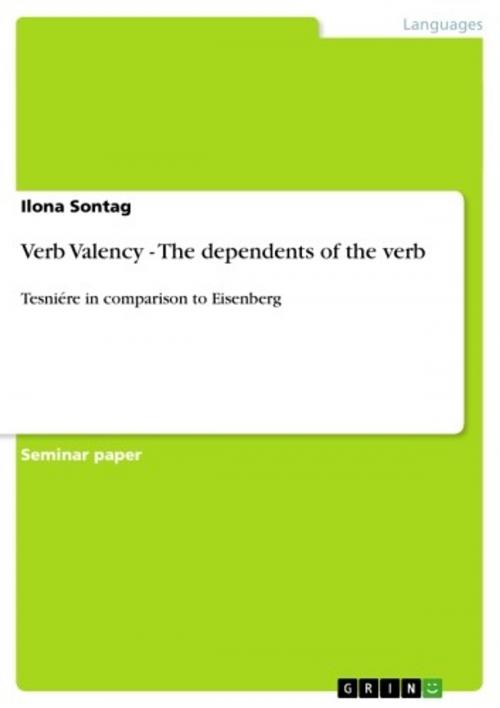Verb Valency - The dependents of the verb
Tesniére in comparison to Eisenberg
Nonfiction, Reference & Language, Study Aids, ESL, Foreign Languages| Author: | Ilona Sontag | ISBN: | 9783640194384 |
| Publisher: | GRIN Publishing | Publication: | October 23, 2008 |
| Imprint: | GRIN Publishing | Language: | English |
| Author: | Ilona Sontag |
| ISBN: | 9783640194384 |
| Publisher: | GRIN Publishing |
| Publication: | October 23, 2008 |
| Imprint: | GRIN Publishing |
| Language: | English |
Seminar paper from the year 2008 in the subject English - Grammar, Style, Working Technique, grade: 1,7, RWTH Aachen University (Institut für Anglistik ), course: Syntactic Questions, 7 entries in the bibliography, language: English, abstract: Although the idea of valency is not new in the field of linguistics, it seems to have received relatively little attention up to now. Lucien Tesnière, who became known as the developer of the so called 'dependency grammar', was one of the first linguists who described the capacity of a verb to bind a certain number of 'actants'1 (cf. Tesnière 1980, 385-386). In his posthumously published book 'Eléments de syntaxe structurale'2 (1959) he called this phenomenon 'valency'. Later on, other linguists adopted his notion, modified and adapted it. One of these linguists is Peter Eisenberg, a German philologist, who wrote some recent works on grammar in which the role of verb valency is often in the center of attention. Because a period of thirty years had passed since Tesnière's first attempt to define the phenomenon of valency in linguistics, Eisenberg's approach is a lot more detailed and includes different criteria for he had the opportunity to contribute his knowledge of other theories which were created after Tesnière's book had been published. This term paper will draw a comparison of two works written by the authors mentioned above with special regard to the words which are dependent on verbs. Since the verb is often in the center of attention when the notion of valency is concerned, the group of the other words which are 'governed' by the verb does not seem to be examined in the same way. Furthermore there does not even seem to be a standard term for such words (perhaps except for 'arguments' (cf. Meyer 2005, 30), but even the notion of arguments is used in diverse ways), so that I will use the word 'dependents' to refer to every possible linguistic element which can be bound by a verb. The main aim of this paper will not only be to provide a small overview of dependents in valency theories, but also to illustrate the pros and cons of each of these theories in a comparison at the end. To introduce the reader into the topic, a small overview of the notion of valency will be given at the beginning of the term paper. Later on, the most important aspects concerning dependents of both theories will be presented separately. After having compared the two works, pointed out the main discrepancies and having stated their benefits respectively their deficiencies, a final conclusion will be given.
Seminar paper from the year 2008 in the subject English - Grammar, Style, Working Technique, grade: 1,7, RWTH Aachen University (Institut für Anglistik ), course: Syntactic Questions, 7 entries in the bibliography, language: English, abstract: Although the idea of valency is not new in the field of linguistics, it seems to have received relatively little attention up to now. Lucien Tesnière, who became known as the developer of the so called 'dependency grammar', was one of the first linguists who described the capacity of a verb to bind a certain number of 'actants'1 (cf. Tesnière 1980, 385-386). In his posthumously published book 'Eléments de syntaxe structurale'2 (1959) he called this phenomenon 'valency'. Later on, other linguists adopted his notion, modified and adapted it. One of these linguists is Peter Eisenberg, a German philologist, who wrote some recent works on grammar in which the role of verb valency is often in the center of attention. Because a period of thirty years had passed since Tesnière's first attempt to define the phenomenon of valency in linguistics, Eisenberg's approach is a lot more detailed and includes different criteria for he had the opportunity to contribute his knowledge of other theories which were created after Tesnière's book had been published. This term paper will draw a comparison of two works written by the authors mentioned above with special regard to the words which are dependent on verbs. Since the verb is often in the center of attention when the notion of valency is concerned, the group of the other words which are 'governed' by the verb does not seem to be examined in the same way. Furthermore there does not even seem to be a standard term for such words (perhaps except for 'arguments' (cf. Meyer 2005, 30), but even the notion of arguments is used in diverse ways), so that I will use the word 'dependents' to refer to every possible linguistic element which can be bound by a verb. The main aim of this paper will not only be to provide a small overview of dependents in valency theories, but also to illustrate the pros and cons of each of these theories in a comparison at the end. To introduce the reader into the topic, a small overview of the notion of valency will be given at the beginning of the term paper. Later on, the most important aspects concerning dependents of both theories will be presented separately. After having compared the two works, pointed out the main discrepancies and having stated their benefits respectively their deficiencies, a final conclusion will be given.















